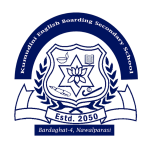Evaluation System
The evaluation system at Kumudini English Boarding Secondary School is structured in line with the National Education Board (NEB) and the National Curriculum of Nepal. This ensures that the school’s assessment procedures are consistent with national standards, providing a comprehensive and standardized approach to evaluating students’ academic performance and overall development.
Here’s how the evaluation system aligns with the NEB and National Curriculum of Nepal:
1. Syllabus and Curriculum:
Kumudini English Boarding Secondary School follows the curriculum prescribed by the Nepal Ministry of Education and National Curriculum Framework (NCF), which is in line with the NEB guidelines. The curriculum includes a range of subjects designed to provide students with a well-rounded education. The subjects are categorized into compulsory subjects (e.g., Nepali, English, Mathematics, Science, Social Studies) and elective subjects (e.g., optional sciences, humanities, and business subjects).
2. Internal Evaluation:
The evaluation system primarily emphasizes internal assessments conducted throughout the academic year. These assessments are designed to evaluate a student’s continuous progress and provide a more holistic understanding of their abilities. According to NEB regulations, the school conducts:
- Formative Assessments: These are regular assessments like quizzes, classwork, assignments, and projects, which contribute to the overall development of the students. These assessments are spread throughout the year and help track students’ understanding of concepts.
- Summative Assessments: These are major tests or exams that occur at the end of the term or academic session, such as mid-term and final exams. These are aligned with NEB guidelines to ensure the academic rigor expected by the national curriculum.
3. Examinations:
- Annual Exams: At the end of each academic year, the school conducts final exams based on the national syllabus. These exams assess students’ knowledge and understanding of the subjects taught throughout the year.
- NEB Board Exams: For students in grades 10 (Secondary Level), they must sit for the Secondary Education Examination (SEE), which is conducted by the NEB. This is a national-level examination, and the results directly impact their transition to higher education. The school prepares students for this exam by following the curriculum and providing focused learning.
4. Grading System:
The evaluation and grading system is based on the guidelines set by the National Curriculum of Nepal and the NEB. For grade 10 students (SEE), the grading system includes the following:
- Grade A+ (Excellent): 85% and above
- Grade A (Very Good): 70% to 84%
- Grade B+ (Good): 60% to 69%
- Grade B (Average): 50% to 59%
- Grade C (Needs Improvement): 40% to 49%
- Grade D (Fail): Below 40%
This grading system is used to evaluate students’ overall performance in the final exams as well as the summative assessments during the year.
5. Subjects and Marks Distribution:
Each subject follows a prescribed marks distribution that is in accordance with the NEB standards. For instance, in the SEE exams, the total marks for each subject are typically 100, which is divided into:
- Theory Marks: 80 marks (focused on knowledge and understanding of the subject)
- Practical Marks: 20 marks (for subjects that require hands-on practice, such as Science, Computer, etc.)
The internal assessments and school-based exams contribute a portion of the total marks that count towards the final evaluation.
6. Teacher and Student Engagement:
Teachers regularly engage with students to track their progress through:
- Parent-Teacher Meetings (PTMs): These meetings offer feedback to parents about their child’s academic progress, behavioral development, and areas of improvement.
- Teacher-Student Interactions: Regular feedback and interactions ensure that students are aware of their performance and can work on weak areas.
7. Promotion Criteria:
Students are promoted to the next grade level based on:
- Internal assessments and class participation: Students are required to demonstrate satisfactory performance in assignments, projects, and class activities.
- Final Exam Results: Passing the annual exams, especially the SEE exams, is crucial for promotion to higher education levels. Students need to achieve a certain minimum percentage or grade to be eligible for promotion, as per NEB guidelines.
8. Co-Curricular Activities:
In line with the National Curriculum of Nepal, co-curricular activities such as sports, arts, and cultural programs are also evaluated. While these do not directly impact academic grades, participation in these activities is important for the holistic development of students. Teachers assess skills like teamwork, leadership, creativity, and discipline through these activities.
9. Special Support for Weak Students:
To ensure no student is left behind, Kumudini English Boarding Secondary School provides special support for students who struggle academically. Remedial classes, extra tutorials, and personalized attention are offered to help these students improve their performance in line with national educational standards.
Conclusion:
Kumudini English Boarding Secondary School’s evaluation system is aligned with the National Education Board (NEB) and the National Curriculum of Nepal, ensuring that students receive a quality education that prepares them for national exams such as the SEE and equips them with skills for further academic and personal success. The system is designed to foster academic rigor, holistic development, and continuous improvement in students.
.
External Evaluation
- Class attendance-min. requirement 90%.
- Assignments and theory classes.
- Mid-term examinations are both theoretical and practical.
- Internal Viva-Voc on Project study.
- General behavior proficiency.
- On the basis of Project work, Internship, and Field visit report for Diploma courses as per the syllabus.
